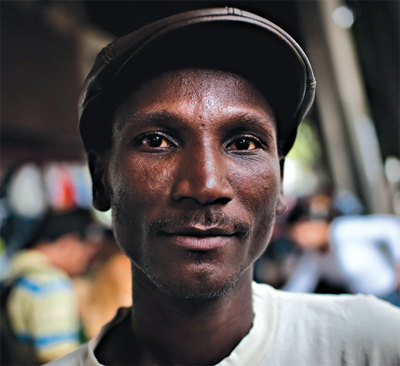
Venezuela welcomed Haitians, like Joseph Dieu Seul after January’s devastating earthquake
By SIMON ROMEROCARACAS, Venezuela - This country is in the throes of an immigration puzzle. While large numbers of the middle class head for the exits, hundreds of thousands of foreign merchants and laborers have put down stakes here in recent years.
The influx may seem surprising. On this booming continent, oil-rich Venezuela is South America’s only shrinking economy this year. Officials are rationing hard currency.
Government takeovers of private businesses are increasing. One prominent financial analyst recently had just two words of advice for investors here: “Run away.” But in the bazaar in this city’s old center, merchants murmur in Arabic, Urdu and Hindi. Haitians pushing ice cream carts chatter in Creole.
Street vendors selling DVDs call out in Colombian-accented Spanish. Sip coffee in Naji Hammoud’s clothing shop, and the outlook is optimistic. “There’s money in the street, whether the price of oil is $8 a barrel or $80,” said Mr. Hammoud, 36, who came here from Lebanon a decade ago. “I could have moved to Europe, Germany, someplace, and done fine, but I would have been someone’s employee. Here, I’m my own boss.”
The opposing tides reflect the country’s increasingly polarized nature. The government of President Hugo Chavez, who recently declared an “economic war” against the “bourgeoisie,” has expropriated 207 private businesses this year , prompting many to seek safer havens elsewhere. “I feel like I can finally breathe again,” said Ivor Heyer, 48, the owner of a boat manufacturing company, who recently moved his entire operation to Colombia, creating more than 100 jobs there.
“I’ve gone from a country where fear is constant over crime and state takeovers to a place that actually welcomes companies involved in something other than oil.” Many immigrants continue to arrive on tourist visas and overstay their visits, drawn by incomes that are still higher than those in some of Venezuela’s neighbors and by a broad array of social welfare programs for the poor.
“One can live with a little bit of dignity here, at least enough to send money home now and again,” said Etienne Dieu-Seul, 35, a Haitian street vendor, who moved here a month before January’s devastating earthquake in Haiti.
As many as four million immigrants have come here from Colombia, according to Juan Carlos Tanus, director of the Association of Colombians in Venezuela. And some continue to arrive, despite the protracted recession here and the recent strides Colombia has made in growing its economy and fighting the rebel groups that have plagued it for so long.
“There’s work in Venezuela for those who want it,” said Arturo Vargas, 39, a Colombian laborer who moved to Caracas last year,
finding jobs as a watchman and at a chicken-processing plant. “This place isn’t perfect, but it’s better than what I left behind.” The influx is driven in part by Venezuela’s long tradition of lenient immigration policies ? dating at least from the years after World War II ? and by the importance of oil.
Even during times of fluctuating oil prices and institutional disarray, revenues from petroleum exports give Venezuela a cushion against the wrenching crises that have jolted its neighbors in the past. Oil money also allows for a broad assortment of imports, creating a large consumer society and opportunities for people to sell things in it.
More than 50,000 Chinese have settled in the country, working largely as shopkeepers. Thousands of merchants and their families from Lebanon, Syria and Jordan have also arrived in recent years, extending a tradition that dates back more than a century . The Middle Eastern community here is big enough to support one of South America’s largest mosques, across the street from a sprawling mission for Lebanese Maronite Christians.
While economic reasons are paramount for immigrants, ideology also plays a small role in attracting some immigrants here. Some from the Middle East find affinities with Venezuela’s contentious policies toward Israel.
Those same policies, combined with fears over violence and economic shifts, have factored into the decisions of thousands of Jews here to emigrate. As with Venezuela’s immigrants, precise figures on Venezuela’s emigrants are unavailable, but Ivan de la Vega, a sociologist here, puts their number in the hundreds of thousands .
In a twist, many of the emigrants are the children or grandchildren of immigrants who came to Venezuela during its long postwar boom. Spain and Portugal, which offer citizenship to descendants of immigrants, have absorbed many Venezuelans. Neighbors like Panama and Colombia, seeking to lure Venezuelan business owners, are welcoming others.
“It was not an easy decision, but it was necessary,” said Esther Bermudez, who recently moved to Montreal. She owns Mequieroir.com, a Web site that offers services for Venezuelans planning to emigrate (its name means “I want to leave”), and she said visits to the site climbed nearly 50 percent this year, to 80,000 a day. The new arrivals are not immune to Venezuela’s problems, confronting issues like restrictions on sending money abroad and rampant crime.
Assailants near Caracas killed one Chinese laborer in September by dousing him with gasoline and burning him alive, according to local news reports. In separate cases in October, kidnappers abducted two Chinese women - one 19, the other 38 ? on the same day. (According to the United States State Department, Venezuela is in the top five for per capita murder rates in the world.) Still, that has not deterred the many new arrivals.
“This is a crazy place, not for families but fine for a single man like me,” said Subash Chand, 25, who moved here a year ago from the northern state of Haryana, in India, to manage a shop in downtown Caracas. “There’s danger and excitement here every day,” Mr. Chand said. “Within that mixture,” he added, “there’s money.”
스마터리빙
more [ 건강]
[ 건강]이제 혈관 건강도 챙기자!
[현대해운]우리 눈에 보이지 않기 때문에 혈관 건강을 챙기는 것은 결코 쉽지 않은데요. 여러분은 혈관 건강을 유지하기 위해 어떤 노력을 하시나요?
 [ 건강]
[ 건강]내 몸이 건강해지는 과일궁합
 [ 라이프]
[ 라이프]벌레야 물럿거라! 천연 해충제 만들기
 [ 건강]
[ 건강]혈압 낮추는데 좋은 식품
[현대해운]혈관 건강은 주로 노화가 진행되면서 지켜야 할 문제라고 인식되어 왔습니다. 최근 생활 패턴과 식생활의 변화로 혈관의 노화 진행이 빨라지고
사람·사람들
more
김응화 단장, 아쿠아리움 퍼시픽 ‘헤리티지 어워드’
김응화무용단의 김응화 단장이 롱비치의 아쿠아리움 오브 더 퍼시픽이 수여하는 2025년 ‘헤리티지 어워드’의 영예를 안았다. 올해 처음 개최된 …

이정임 무용원, 팬아시아 전통예술 경연대회
남가주 최대 규모의 아시아 전통 예술 경연대회인 팬아시아 댄스 앤 드럼 대회에서 이정임무용원의 청소년 단원들이 경연에 참가해서 전체 대상 등 …
유희자 국악무용연구소, 팬아시아 전통예술대회
지난 15일 샌개브리얼 셰라톤 호텔에서 열린 남가주 최대 규모의 전통 무용대회인 팬아시아 댄스 앤 드럼 대회에서 유희자 국악무용연구소(원장 유…
송년행사 안내해드립니다
다사다난했던 2025년이 이제 종착점을 향해 달려가고 있습니다. 한 해를 잘 마무리하고 2026년 새해를 힘차게 맞기 위한 다짐을 하는 송년 …
‘군중’ 시리즈 이상원 작가 첫 LA전시회
아케디아 소재 홈갤러리인 ‘알트프로젝트’(대표 김진형)가 오는 29일(토)부터 한국 블루칩 작가 이상원이 참여하는 전시 ‘인 드리프트(In D…
많이 본 기사
- 남가주에 또 폭풍우 최대 2인치 비 예보
- 공항 신원확인 강화… ‘리얼 ID’ 없으면 18달러 내야
- 1,600만불 메디케어 사기 일당 ‘… 2
- [LA 오토쇼 특집] “자동차 시장 격동”… 전기·하이브리드 출시 ‘경쟁’
- 매일 10분만 바꿔도… 당뇨 예방 6대 생활수칙
- 트럼프 2,000달러 관세 배당 없던일로?
- 나란히 선 미 대통령·부통령 부인
- “최첨단 신차들 한 눈에”… 2025 LA 오토쇼 개막
- UC 등록금 치솟는다 “매년 최고 5% 인상”
- 저승까지 추적… ‘신정동 연쇄살인범’ 20년 만에 찾았다
- 한인 추정 40대 여성 자금세탁 121개월형
- 이민단속요원 막무가내 “문 열어라”
- 체니 전 부통령 장례식… 부시·바이든 참석, 트럼프는 불참
- [삶과 생각] 친구를 보내며
- “히터도 못켜요”… 올 겨울 난방비 ‘역대급’
- 아태계 대상 증오범죄 여전히 많다… 팬데믹 이전의 3배
- [화제] ‘온통 황금’… 변기 하나에 1,200만불
- ‘2025 뉴욕 미슐랭 가이드’에 한인 레스토랑 12곳 선정
- ‘유격수가 얼마나 귀한데… ‘ MLB닷컴, 김하성 ‘FA 3티어-1년 계약 가능성’ 전망
- “미루면 더 아프다”… 40대 넘어서 뽑는 사랑니, 합병증 4.8배 급증
- 영어교재 ‘이것이 미국영어다’ 저자 조화유씨 별세
- 이민법원 적체에… 한인들‘신분 위기’
- “늦기전 시민권 신청 서두르세요”
- ‘트럼프 정적’ 코미 기소 “절차 위반”
- [오피셜] 손흥민-메시, 약 8만 관중 앞 맞대결 확정... 내년 MLS 개막전 격돌
- 론 김 뉴욕주하원의원, 플러싱 YMCA에 건축지원금 300만불 전달
- “행복하게 살았답니다”..신민아♥김우빈, 누적 기부액 51억 커플의 ‘해피엔딩’
- 특검, 김건희-건진법사 연결고리 ‘도이치 주포’ 구속영장 청구
- 추수감사 예배 통해 장애인 사랑 실천
- “해외서 한글로 쓰는 마음”… 재외동포문학상 시상식
- “돈바스 넘기고 병력 감축”… 미·러 종전안 푸틴 입맛대로
- 재외국민까지 노리는 보이스피싱
- 김수현 측, ‘28억 소송’ 광고주에 “’미성년’ 故 김새론과 교제 NO”
- 연말시즌 온라인 샤핑 노린 사기 ‘기승’
- 셧다운때 개근한 항공관제사 776명에 1만달러 보너스
- 트럼프 “조지아 단속 말렸다” “외국 전문인력 필요” 강조
- 2026년 은퇴플랜 대개편 총정리
- 최소의 노력으로 최대 효과를 노리는 401(k)
- VA 34%·MD 30%만 모기지 ‘0’
- 뉴노멀된 고환율… 항공사 “비행기 리스 대신 직구”
- 박시후, ‘유부남 불륜 주선’ 의혹에 입 열었다.. “휴대폰 절취 후 왜곡”
- 尹 “’제대로 했다’ 여론 있다”며 계엄 국무회의 CCTV 제출요청
- [한국춘추] 푸른 초원에 부국평화를 노래하며
- ‘포트2 확정’ 홍명보호 입장도 바뀌었다, 실현 바라야 하는 ‘이탈리아 루머’
- 수사외압 마지막 퍼즐 ‘임성근 구명로비’ 의혹 끝내 미제로
- “안전·깨끗한 한인타운 만들기” 함께 나선다
- 李대통령, 이집트 공식방문 끝내고 출국…G20 열리는 남아공으로
- 첫 내집 마련 ‘꿈’ 40세로 늦어졌다
- 래퍼 프라스 미셸, ‘오바마 선거자금 불법기부’ 징역 14년형
- 이찬원, 2년 연속 ‘KBS 연예대상’ MC 발탁..이민정과 재회
1/5지식톡

-
 테슬라 자동차 시트커버 장착
0
테슬라 자동차 시트커버 장착
0테슬라 시트커버, 사놓고 아직 못 씌우셨죠?장착이 생각보다 쉽지 않습니다.20년 경력 전문가에게 맡기세요 — 깔끔하고 딱 맞게 장착해드립니다!장착비용:앞좌석: $40뒷좌석: $60앞·뒷좌석 …
-
 식당용 부탄가스
0
식당용 부탄가스
0식당용 부탄가스 홀세일 합니다 로스앤젤레스 다운타운 픽업 가능 안녕 하세요?강아지 & 고양이 모든 애완동물 / 반려동물 식품 & 모든 애완동물/반려동물 관련 제품들 전문적으로 홀세일/취급하는 회사 입니다 100% …
-
 ACSL 국제 컴퓨터 과학 대회, …
0
ACSL 국제 컴퓨터 과학 대회, …
0웹사이트 : www.eduspot.co.kr 카카오톡 상담하기 : https://pf.kakao.com/_BEQWxb블로그 : https://blog.naver.com/eduspotmain안녕하세요, 에듀스팟입니다…
-
 바디프렌드 안마의자 창고 리퍼브 세…
0
바디프렌드 안마의자 창고 리퍼브 세…
0거의 새제품급 리퍼브 안마의자 대방출 한다고 합니다!8월 23일(토)…24일(일) 단 이틀!특가 판매가Famille: $500 ~ $1,000Falcon: $1,500 ~ $2,500픽업 & 배송직접 픽업 가능LA…
-
 바디프렌드 안마의자 창고 리퍼브 세…
0
바디프렌드 안마의자 창고 리퍼브 세…
0거의 새제품급 리퍼브 안마의자 대방출 한다고 합니다!8월 23일(토)…24일(일) 단 이틀!특가 판매가Famille: $500 ~ $1,000Falcon: $1,500 ~ $2,500픽업 & 배송직접 픽업 가능LA…
케이타운 1번가
오피니언
 조지 F·윌 워싱턴포스트 칼럼니스트
조지 F·윌 워싱턴포스트 칼럼니스트 [조지 F. 윌 칼럼] 세계를 가장 크게 바꾼 사건, 미국 혁명전쟁
 이희숙 시인·수필가
이희숙 시인·수필가 [금요단상] 낙엽 위에 남겨진 향
 김정곤 / 서울경제 논설위원
김정곤 / 서울경제 논설위원[만화경] ‘중동판 꽌시’ 와스타

[왈가 왈부] ‘패트 충돌’ 선고에 여야 “정치 판결” “자성 촉구” 아전인수?
 수잔 최 한미가정상담소 이사장 가정법 전문 변호사
수잔 최 한미가정상담소 이사장 가정법 전문 변호사 [수잔 최 변호사의 LIFE &] 서울 가을 자락에서 만난 쉼터
 강민수 을지대 첨단학부 교수 한국인공지능학회장
강민수 을지대 첨단학부 교수 한국인공지능학회장 [기고] 디지털 주권의 토대, 소버린 클라우드
1/3지사별 뉴스

론 김 뉴욕주하원의원, 플러싱 YMCA에 건축지원금 300만불 전달
론 김 뉴욕주하원의원이‘플러싱 커먼스’(Flushing Commons)에 새롭게 들어설 예정인 플러싱 YMCA에‘건축지원금’(Capital F…
이민법원 적체에… 한인들‘신분 위기’

“함께 만들어 가는 평화의 약속”
“오늘 출범식은 단순한 시작이 아니라 한인사회와 함께 만들어가는 평화와 희망의 약속입니다. 한반도의 평화는 거대한 정치적 언어가 아닌 우리 같…
VA 34%·MD 30%만 모기지 ‘0’

오프라인 한국어 과정 성공적 마무리 단계
샌프란시스코 한국 교육원(허혜정 원장)이 2025년 가을 학기에 처음 개설한 오프라인 한국어 과정 ‘한국어 1’이 오는 22일 성공적인 마무리…
마라나타 비전교회, 장로/안수집사 임직및 장로 은퇴예배

오늘 하루 이 창 열지 않음 닫기 


















































.png)


댓글 안에 당신의 성숙함도 담아 주세요.
'오늘의 한마디'는 기사에 대하여 자신의 생각을 말하고 남의 생각을 들으며 서로 다양한 의견을 나누는 공간입니다. 그러나 간혹 불건전한 내용을 올리시는 분들이 계셔서 건전한 인터넷문화 정착을 위해 아래와 같은 운영원칙을 적용합니다.
자체 모니터링을 통해 아래에 해당하는 내용이 포함된 댓글이 발견되면 예고없이 삭제 조치를 하겠습니다.
불건전한 댓글을 올리거나, 이름에 비속어 및 상대방의 불쾌감을 주는 단어를 사용, 유명인 또는 특정 일반인을 사칭하는 경우 이용에 대한 차단 제재를 받을 수 있습니다. 차단될 경우, 일주일간 댓글을 달수 없게 됩니다.
명예훼손, 개인정보 유출, 욕설 등 법률에 위반되는 댓글은 관계 법령에 의거 민형사상 처벌을 받을 수 있으니 이용에 주의를 부탁드립니다.
Close
x